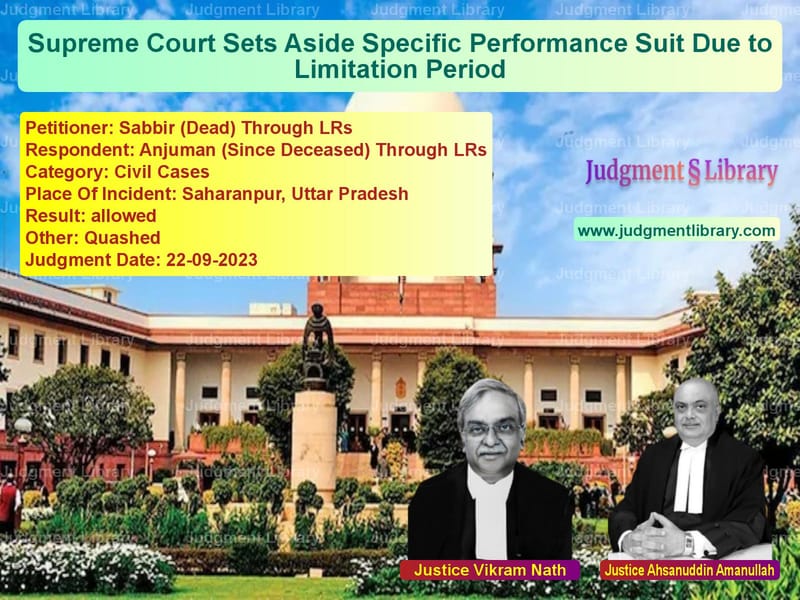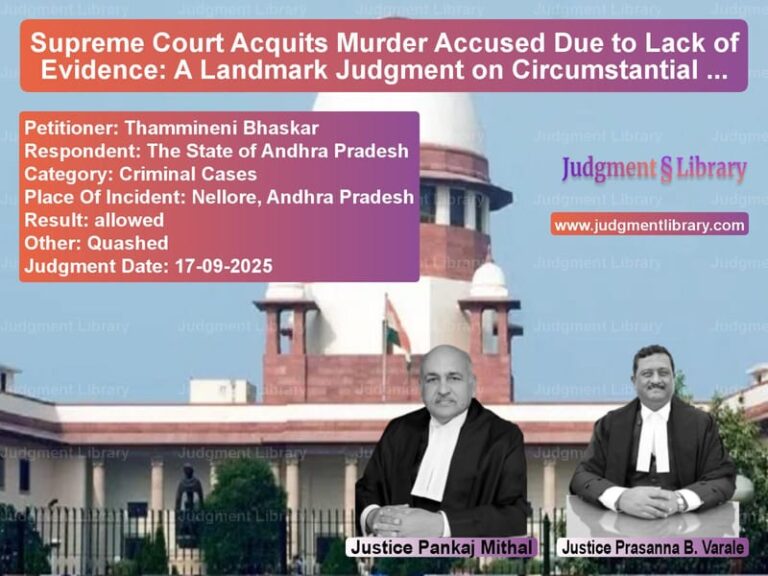Supreme Court Sets Aside Specific Performance Suit Due to Limitation Period
The Supreme Court of India recently delivered a crucial judgment in the case of Sabbir (Dead) Through LRs vs. Anjuman (Since Deceased) Through LRs, ruling that the suit for specific performance was barred by limitation. The Court reinstated the First Appellate Court’s order, dismissing the suit and emphasizing that parties seeking enforcement of agreements must act within the statutory timeframe.
The Court set aside the Allahabad High Court’s ruling, which had restored the Trial Court’s order granting specific performance. The judgment underscores the importance of adhering to Article 54 of the Limitation Act, 1963, ensuring that contractual obligations are enforced within the legally prescribed period.
Background of the Case
The dispute arose from an Agreement to Sell (ATS) executed on July 31, 1975, between the original plaintiff and the defendant. The agreement stipulated that the defendant (appellant) would apply for permission to sell the property within eight days, and upon obtaining permission, notify the plaintiff (respondent). The sale deed was to be executed within fifteen days of such intimation.
Key Events in the Legal Proceedings:
- 1975: The ATS was signed, with an earnest money deposit of ₹1,000 against a total sale consideration of ₹6,000.
- The appellants did not apply for the required permission, leading to a delay in execution.
- 1981: The plaintiff filed Suit No. 5 of 1981 for specific performance.
- 1982: The Trial Court decreed the suit in favor of the plaintiff.
- 1984: The First Appellate Court reversed the Trial Court’s decision, dismissing the suit as time-barred.
- 2010: The High Court restored the Trial Court’s order, leading to the present appeal.
The appellants contended that the plaintiff had waited over five years without taking legal action, demonstrating a lack of readiness and willingness to perform their part of the contract.
Key Legal Issues Considered
- Whether the plaintiff’s delay in filing the suit violated the limitation period under Article 54 of the Limitation Act, 1963.
- Whether the plaintiff was ready and willing to perform their obligations under the contract.
- Whether the Allahabad High Court erred in overturning the First Appellate Court’s decision.
Petitioner’s Arguments (Sabbir & Ors.)
The appellants, represented by their legal counsel, argued that:
- The suit was filed on January 1, 1981, more than five years after the agreement, exceeding the three-year limitation period.
- The respondents failed to demonstrate due diligence in enforcing the agreement.
- Clause 3 of the ATS required the appellants to apply for permission within eight days, meaning the limitation period started after this deadline.
- The High Court did not provide adequate reasoning for reversing the well-reasoned decision of the First Appellate Court.
Respondent’s Arguments (Anjuman & Ors.)
The respondents countered these claims by arguing that:
- The appellants never applied for permission, meaning the obligation to execute the sale deed never arose.
- The delay in filing the suit was justified as the appellants continuously refused to execute the agreement.
- The Trial Court correctly decreed specific performance, recognizing the unfair advantage taken by the appellants.
Supreme Court’s Analysis
The Supreme Court found that the respondents had delayed their claim unreasonably:
- The suit should have been filed within three years from the date the defendants failed to apply for permission, which was in 1975.
- By waiting for over five years, the respondents forfeited their right to specific performance.
- The High Court’s judgment lacked adequate reasoning and improperly interfered with the First Appellate Court’s findings.
The judgment observed:
“The law of limitation must be applied strictly, even if it results in hardship. A party cannot be allowed to sleep over its rights indefinitely.”
Regarding the duty of the respondents, the Court stated:
“The respondents had the responsibility to act diligently and enforce their contractual rights within the limitation period.”
Final Judgment
The Supreme Court ruled in favor of the appellants and dismissed the suit, holding that:
- The High Court erred in reversing the First Appellate Court’s well-reasoned decision.
- The suit was time-barred under Article 54 of the Limitation Act.
- The respondents failed to demonstrate readiness and willingness to perform the contract.
- The appellants must refund the earnest money of ₹1,000 with ₹1,50,000 in compensation.
The Court concluded:
“The appeal is allowed, and the High Court’s judgment is set aside.”
Implications of the Judgment
- Reaffirms the strict application of limitation laws in specific performance suits.
- Prevents parties from indefinitely delaying legal claims under property agreements.
- Emphasizes that contractual obligations must be enforced promptly.
- Ensures fairness in contractual dealings by preventing undue advantage to either party.
Conclusion
The Supreme Court’s ruling in this case highlights the significance of acting within statutory deadlines in contract enforcement cases. By dismissing the suit as time-barred, the Court reinforced that parties must diligently pursue their legal rights. This judgment sets a crucial precedent for future property disputes, ensuring that contract enforcement follows strict legal timelines.
Petitioner Name: Sabbir (Dead) Through LRs.Respondent Name: Anjuman (Since Deceased) Through LRs.Judgment By: Justice Vikram Nath, Justice Ahsanuddin Amanullah.Place Of Incident: Saharanpur, Uttar Pradesh.Judgment Date: 22-09-2023.
Don’t miss out on the full details! Download the complete judgment in PDF format below and gain valuable insights instantly!
Download Judgment: sabbir-(dead)-throug-vs-anjuman-(since-decea-supreme-court-of-india-judgment-dated-22-09-2023.pdf
Directly Download Judgment: Directly download this Judgment
See all petitions in Property Disputes
See all petitions in Contract Disputes
See all petitions in Judgment by Vikram Nath
See all petitions in Judgment by Ahsanuddin Amanullah
See all petitions in allowed
See all petitions in Quashed
See all petitions in supreme court of India judgments September 2023
See all petitions in 2023 judgments
See all posts in Civil Cases Category
See all allowed petitions in Civil Cases Category
See all Dismissed petitions in Civil Cases Category
See all partially allowed petitions in Civil Cases Category







